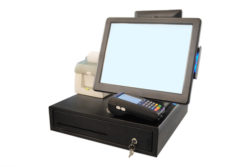Top Class Actions’s website and social media posts use affiliate links. If you make a purchase using such links, we may receive a commission, but it will not result in any additional charges to you. Please review our Affiliate Link Disclosure for more information.

The Fair and Accurate Credit Transaction Act (FACTA) was written into law in 2003. It set up a number of regulations to help protect consumers’ credit and debit card information from being exposed. This law has the goal of helping protect consumers from fraud and identity theft.
The two main ways in which the FACTA protects consumers from having their credit card information stolen is by prohibiting vendors from doing the following:
- including any part of the credit/debit card expiration date on a customer receipt
- including any numbers other than the last five digits of a credit card number of a customer receipt
Digits other than the allowed digits should be covered up by the use of symbols like * and # on a printed receipt. These regulations apply to consumer copies of receipt, but not the merchant copies of receipts, which may incorporate more credit/debit card information.
FACTA regulations do make some exceptions for these regulations. For example, when a card is manually imprinted into a receipt or handwritten receipts used to process cards may display more information than printed receipts.
Sometimes, FACTA violations can be hard to spot on a receipt. Here are a number of ways in which an expiration date can be unlawfully included on a printed receipt. Keep in mind that listing even a part of an expiration date can violate the FACTA credit card protections.
Example 1: EXP: 05/18
Example 2: EXP: 05/2018
Example 3: EXP: 052018
Example 4: EXP: 0518
Example 5: Expires: 0518
Example 6: Exp Date: 05/18
Example 7: Exp Date: 05/31/18
Example 8: EXPIRY: 05/18
Example 9: 05/18
Example 10: 0518
Example 11: Exp. Date 05/**
Example 12: EXP. **/18
Below are a number of ways in which credit cards can be unlawfully listed on customer receipts. Even if there are fewer than five digits of a credit card number listed on a receipt, if those numbers are not the last five, then a merchant may be in violation of the FACTA.
Example 1: 22** **** **** 8888
Example 2: **** **41 **** 9734
Example 3: **** **** **89 ****
These FACTA regulations apply to receipts printed by vendors, provided at restaurants, printed by cash registers, or printed at self-service kiosks. Point-of-sale machines, invoice systems, and sales terminals are also subject to these regulations.
These regulations were put into place to protect consumers from identity and credit card information theft. Given that there are so many ways in which violations of FACTA credit card protections can occur, it is easy for your personal information to be exposed and to fall into the wrong hands. Experts recommend that you look closely at your printed receipts from purchases made with credit and debit cards.
If you discover that you have been given a receipt, or if a receipt has been printed in such a way that violates the FACTA, you may be in a position to file a lawsuit and seek compensation.
Free FACTA Class Action Lawsuit Investigation
If you made one or more purchases and the retailer provided you with a receipt that contained more than the last five digits of your credit or debit card number or the expiration date, you may be eligible for a free class action lawsuit investigation and to pursue compensation for these FACTA violations.
ATTORNEY ADVERTISING
Top Class Actions is a Proud Member of the American Bar Association
LEGAL INFORMATION IS NOT LEGAL ADVICE
Top Class Actions Legal Statement
©2008 – 2024 Top Class Actions® LLC
Various Trademarks held by their respective owners
This website is not intended for viewing or usage by European Union citizens.














